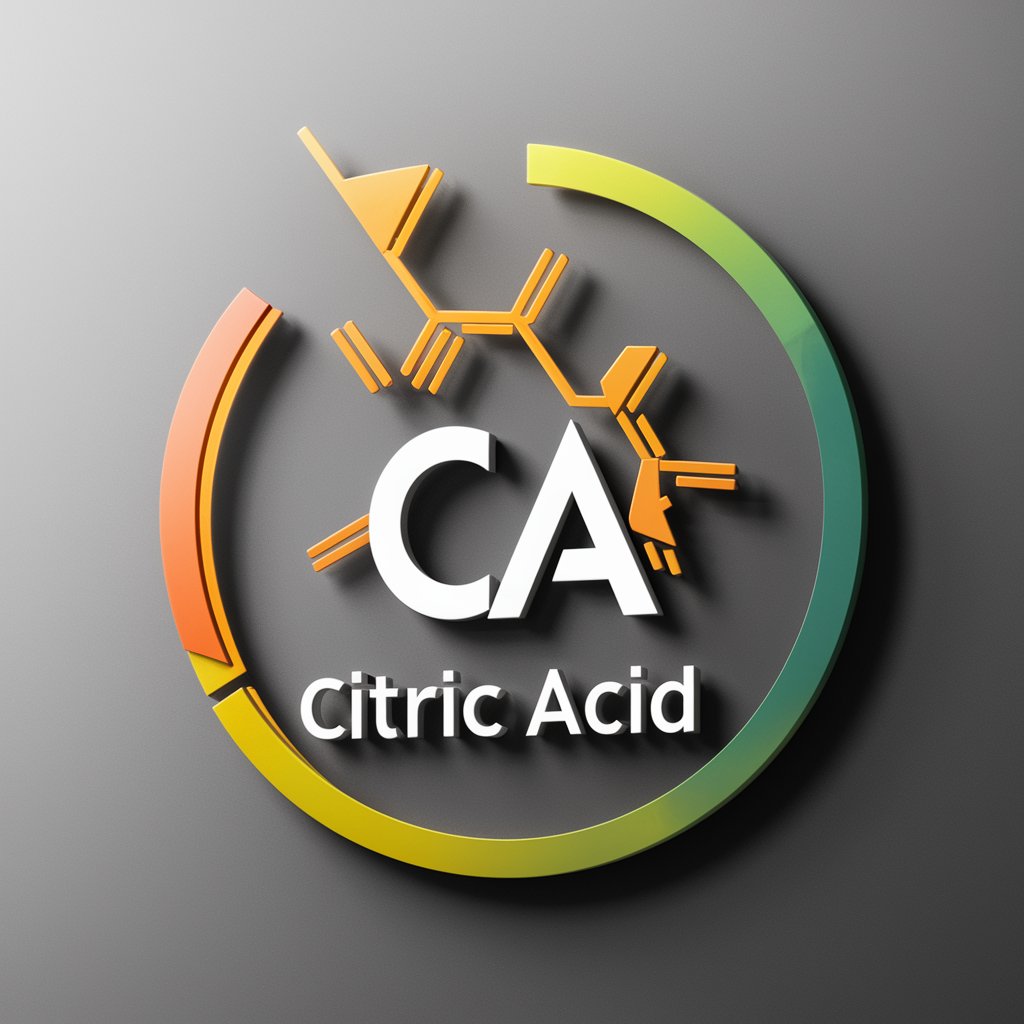Citric Acid - Comprehensive Citric Acid Insights

Welcome! Let's dive into the fascinating world of citric acid.
Unlocking Citric Acid's Full Potential
Explain the chemical properties of citric acid.
Discuss the role of citric acid in food preservation.
Describe the industrial applications of citric acid in cleaning products.
How does citric acid interact with other substances in biochemical processes?
Get Embed Code
Overview of Citric Acid
Citric acid, a weak organic acid with the chemical formula C6H8O7, is prevalent in citrus fruits, particularly lemons and limes, where it can constitute up to 8% of the dry weight of the fruit. It is valued for its sour taste and is a pivotal compound in the metabolic pathways of aerobic organisms, playing a crucial role in the citric acid cycle (Krebs cycle), which is essential for energy production in cells. Beyond its biological significance, citric acid has been industrially synthesized since the early 20th century and serves a multitude of purposes across various industries. For example, in the food industry, it is used as a flavor enhancer and preservative, while in the cleaning sector, it is prized for its ability to remove hard water stains and build-up. Powered by ChatGPT-4o。

Key Functions of Citric Acid
Flavoring and Preservative in Food
Example
Citric acid is added to candies, soft drinks, and ice creams to impart a tart, refreshing flavor.
Scenario
In the production of jelly candies, citric acid is used to adjust the acidity, enhancing the fruit flavors and extending the shelf life by inhibiting microbial growth.
Chelating Agent
Example
Citric acid binds with metal ions in water, softening it, which is beneficial in soaps and detergents.
Scenario
In laundry detergents, citric acid is used to soften water, allowing the detergents to be more effective at cleaning clothes and preventing the buildup of minerals on fabrics.
Cosmetics and Personal Care
Example
Citric acid is used in shampoos, conditioners, and bath bombs to balance pH levels.
Scenario
In skincare, citric acid is incorporated into formulas as an alpha hydroxy acid (AHA), aiding in the exfoliation of dead skin cells and promoting skin renewal.
Cleaning Agent
Example
It is effective in removing limescale from boilers, heaters, and household appliances.
Scenario
Citric acid is used in descaling agents for coffee makers and kettles, where it dissolves mineral buildup without leaving harmful residues.
Biochemical Role
Example
Citric acid plays a central role in the citric acid cycle, an essential metabolic pathway in cells.
Scenario
In cellular respiration, citric acid is involved in the conversion of carbohydrates, fats, and proteins into carbon dioxide, water, and energy, showcasing its vital function in energy production within living organisms.
Target User Groups for Citric Acid
Food Industry Professionals
Manufacturers of beverages, candies, and processed foods rely on citric acid for its preservative and flavor-enhancing properties, making it indispensable for product quality and shelf-life extension.
Household and Industrial Cleaning Companies
Companies formulating cleaning agents utilize citric acid for its ability to combat hard water stains, limescale, and rust, ensuring effective, eco-friendly cleaning solutions.
Cosmetic Formulators
Specialists in skincare and haircare products incorporate citric acid to adjust product pH, promote skin renewal, and enhance product stability and safety.
Environmental and Health-conscious Consumers
Individuals seeking natural, safe alternatives to chemical additives in foods, cosmetics, and cleaning products find citric acid a preferable option due to its biodegradability and non-toxic nature.
Researchers and Educators
Academics studying metabolic pathways, energy production, and the chemical properties of acids use citric acid as a key subject in biochemical and chemical education and research.

Using Citric Acid: A Guide
1
Initiate your journey with citric acid by exploring its potential without any commitments; head over to a platform that offers comprehensive insights without necessitating a sign-up or subscription.
2
Understand the concentration required for your application. For cleaning, a 5-10% solution is effective, while in food, it is used in much smaller quantities, often less than 0.5%.
3
Prepare the solution or mixture as per your needs. For cleaning, dissolve citric acid powder in water. For culinary uses, blend it with the ingredients as per the recipe.
4
Apply or use the citric acid solution appropriately. For descaling, apply the solution to the surface and let it sit before rinsing. In food, mix it thoroughly to achieve the desired taste or preservative effect.
5
Always wear protective gear like gloves when handling citric acid in its concentrated form to avoid irritation. Store it in a cool, dry place away from direct sunlight.
Try other advanced and practical GPTs
Subway Directions
Navigate subways easily with AI

アダチさん36号(クラスタサービス篇)
Empowering Cluster Services with AI

Nahida
Enhancing Your Genshin Impact Adventure

DocNinjas
Empowering document creation with AI

Humidity
Harness AI for Mastering Moisture

Sonic
Empowering Innovation with AI

Logo Mastermind
Craft Your Brand's Identity with AI

Ad Wizard
Empower Your Marketing with AI

Payday Loan
Navigate Payday Loans with AI Expertise

Skilled Labor
Empowering projects with AI-driven trade expertise

SEL Helper
Empowering SEL with AI

Eros GPT
Empowering Conversations with AI

In-Depth Q&A on Citric Acid
What is citric acid and where is it found?
Citric acid is a weak organic acid with the chemical formula C6H8O7. It naturally occurs in citrus fruits, such as lemons and limes, and is widely used in the food, cosmetic, and cleaning industries due to its preservative and acidic properties.
How is citric acid used in food preservation?
In food preservation, citric acid acts as an antioxidant to prevent spoilage and as a pH adjuster to inhibit bacterial growth. It's commonly added to jams, jellies, candies, and soft drinks to extend shelf life and enhance flavor.
Can citric acid be used for cleaning, and how?
Yes, citric acid is an effective eco-friendly cleaner. It removes limescale, rust, and soap scum from appliances and surfaces. Mix it with water to create a cleaning solution, apply to the affected area, let it work for a few minutes, then rinse or wipe clean.
Is citric acid safe for skincare?
Citric acid is used in skincare products as an antioxidant, pH adjuster, and exfoliant. It promotes skin renewal by removing dead skin cells. However, it should be used in appropriate concentrations to avoid skin irritation.
How does citric acid affect the environment?
Citric acid is considered environmentally friendly because it's naturally occurring and biodegradable. It breaks down into harmless compounds, making it a preferable choice over synthetic chemicals for cleaning and personal care products.
